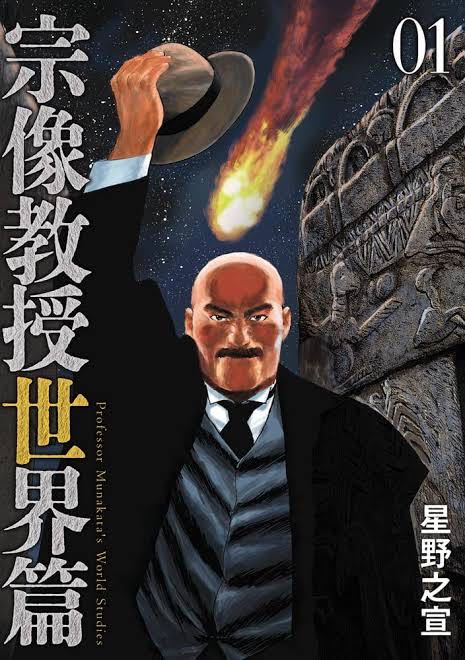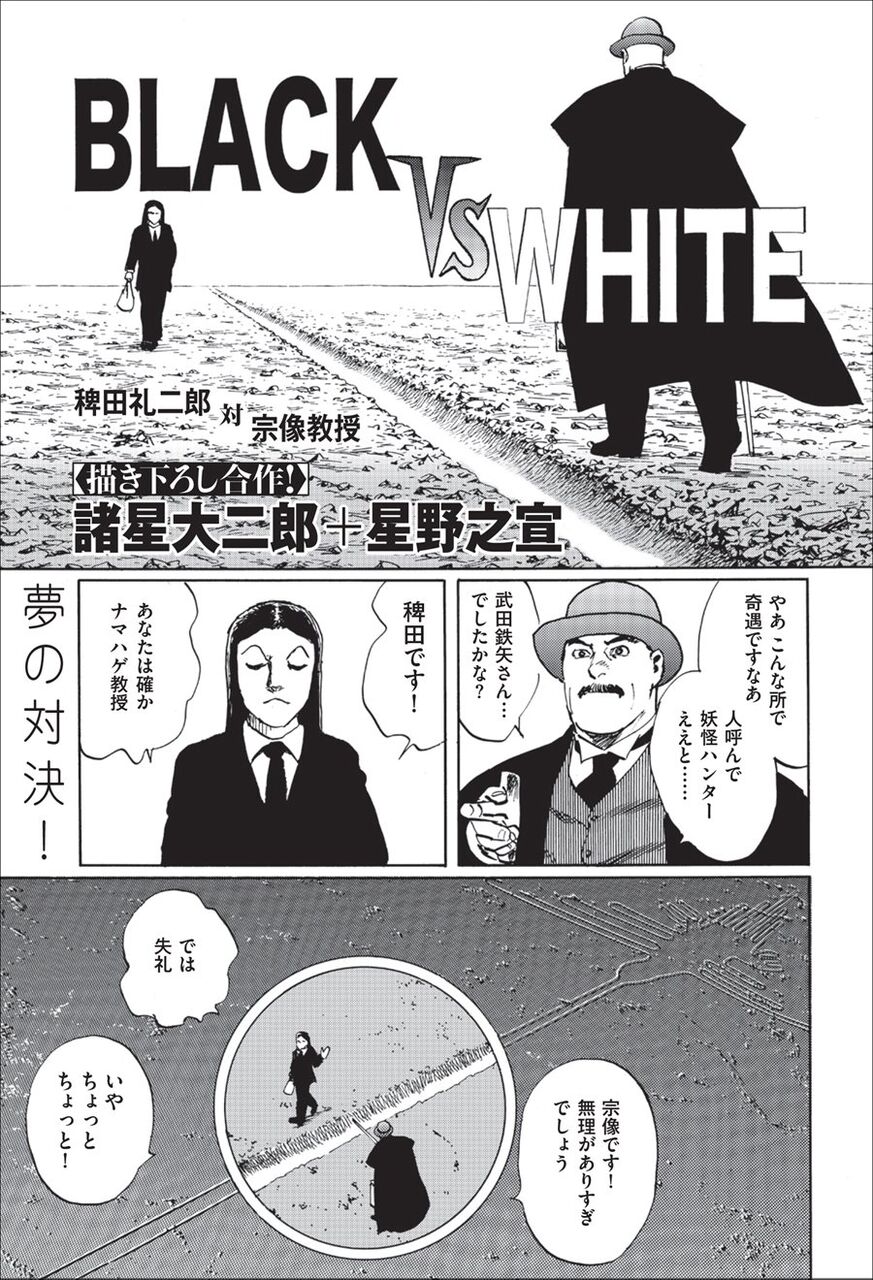
Professor Munakata’s World Studies 01 by Yoshinobu Hoshino
Why did we end up inviting Professor Munakata to the lecture?
>>1
Well, I’m from Fukuoka, my hometown…
“It’s unfortunate that someone like Professor Munakata has made statements that stray from historical scholarship…”
Yeah, it’s been like this for a while…
It’s strange that while Hieda-sensei is treated as a heretical scholar in the story, Professor Munakata is given a certain level of recognition in the academic community.
It feels very much like the comparative mythology of the Dumézil school.
It’s grand and exciting, but it’s not legitimate history.
It’s interesting as historical fiction, but if we don’t occasionally let legitimate historians scrutinize it, it feels like people might actually start believing it.
This person is a historian, but they only do cultural negotiations and comparative mythology, so they have the impression that people around them are saying various things.
In the current series, they no longer forcefully link it to iron as they used to in the past.
The professor has become more mellow…
Rather, Professor Munakata is mainstream.
It seems that people who are kind of unconventional often end up in enemy positions.
I thought that even Mr. Hieda, who is treated like an outcast, would only be involved in one episode, but he is actually quite ordinary, teaching and being called for excavation research.
I was surprised that the girl who suddenly held the heroine position in the world arc had died.
Imibe-san is too pitiful…
It’s more like being a cultural anthropologist, isn’t it?
There are people like that in real life too, for example, someone who is a hot topic in society through books on politics and economics, but in academic circles or universities, they might be viewed as someone whose expertise is in educational policy.
Mr. Hieda frequently encounters real strange entities, but I only do so occasionally…
It’s nice, isn’t it?
Cyclops
But wasn’t there a world-destroying scenario in the Munakata world at least once?
BLACK Vs WHITE Reijirou Zendata vs Professor Munakata 《Origami Collaboration!》 Daijirou Morohoshi + Yoshinobu Hoshino A dream confrontation! You are certainly Professor Yamakei Zendata! Well, what a coincidence to meet here! They call me the Yo-kai Hunter. Um… Was it Tetsuya Takeda? Then excuse me, I’m Munakata! That’s a bit too forced, don’t you think? No, wait, wait!
Dream Match
I don’t know much about Dumézil, but I’ve heard that Foucault was heavily influenced by him, so I have some kind of image of it.
Mr. Hieda probably hasn’t published much research, yet has ended up in a professor position, so there seems to be a perception that he is being told to produce results and that he is not highly regarded.
Such people exist in reality too.
They used to say I resemble Kenji Haga (from the movies) back in the day.
It’s Kenji Sawada!
Julie is now an old, decrepit man.
In the past, everything was like a snake! Snake! It was a strong style like Yoshino Yuko doing it with iron.
It’s common in sociology to abstract, classify, and explain things in a well-organized manner.
The actor Hideki Takahashi from the drama wasn’t bald, but he looked just like him.
Honestly, I think Professor Munakata makes more leaps and unwarranted connections than Dr. Hieda when I read.
It seems like Professor Hieda often acted more like an observer who explains what has happened.
Professor Munakata clearly goes to weave a story.
Immigrants and horse-riding nomads are being used too conveniently!
Kana-chan was rejected by a professor, and it was a life with no good things, ending in a tragic accident.
Oh, I don’t really understand, but…
Beware of the folklore ball.
When I was reading it during the commotion,
I let out a strange laugh when Yasuké appeared.
Since Hoshino-sensei tends to incorporate trendy topics, it can’t be completely dismissed as a coincidence.
I really love that in Hoshino-sensei’s manga adaptation of Japan’s longest day, he suddenly starts to endlessly express his theories within the story.
I often wonder why there are still people who bring up the theory of the conquest by horse-riding tribes online.
When I read Fire Bird after a long time, there was a depiction like that, and I thought, “Is this it…!”
The influence is amazing, Mr. Tezuka.
You’re too quick to develop a sci-fi-like argument!
I really like the story of the priestess’s bloodline, but it’s impressive how the author weaves in entertainment and mystery into aspects that are unclear and based on history.

![[Manga] The magic trick that everyone tried to master as kids but couldn’t is trending, lol.](https://otaku-reviews.net/wp-content/uploads/2025/06/bf53dd2f.jpg)
![[Manga Time Kirara] Tell me your favorite couple in Kirara.](https://otaku-reviews.net/wp-content/uploads/2025/06/7f363a8b.jpg)
![[Gundam GQuuuuuuX] Even though you’re a Newtype, you’re so insensitive, Egusabe-kun.](https://otaku-reviews.net/wp-content/uploads/2025/06/b96ae33d.jpg)
![[Rune Factory] I’m sorry, but I live behind the general shrine.](https://otaku-reviews.net/wp-content/uploads/2025/06/af0f4933.jpg)
![[Fullmetal Alchemist] I have no certainty, but I feel like Envy is the weakest among the homunculi.](https://otaku-reviews.net/wp-content/uploads/2025/06/da613d5c.png)
![[Thunder thunder thunder] I thought this cover was sexy… so I bought it, and it turned out to be more interesting than I expected.](https://otaku-reviews.net/wp-content/uploads/2025/06/d303d5fc.jpg)